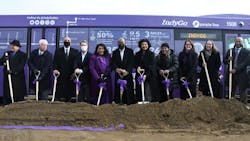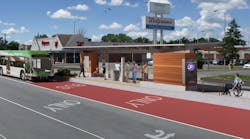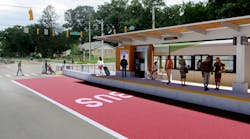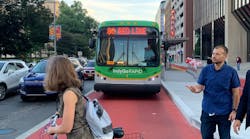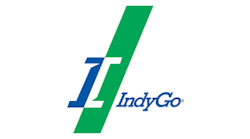The Indianapolis Public Transportation Corporation (IndyGo) held a groundbreaking event on Feb. 25 to mark the start of construction of its second bus rapid transit (BRT) line, the Purple Line. The BRT project will connect downtown Indianapolis to Lawrence – neighborhoods once served by streetcars and other forms of urban transportation. IndyGo believes connecting the communities with the Purple Line will return them to the “bustling, thriving days of the past.”
“The start of Purple Line construction symbolizes the beginning of new opportunity and growth for an entire community,” said IndyGo President and CEO Inez Evans. “We know this project will bring unprecedented renewal and phenomenal transformation as residents take advantage of the opportunity to move forward faster.”
When the Purple Line opens in 2024, it will connect nearly 60,000 residents to more than 134,000 jobs all within walking distance along the 15.2-mile corridor. Of those residents living within walking distance, more than 30 percent are classified as low-income and more than 61 percent identify as minority.
“Connection and enhanced mobility are key for our city and its residents’ success,” said U.S. Rep. André Carson (D-IN-7). “The Purple Line will take IndyGo’s bus rapid transit network to the next level and set an example for the nation on what’s possible when you put the community and riders first with faster, innovative, zero-emissions transit.”
The Purple Line is the second of three planned BRT projects included in the Marion County Transit Plan. The first BRT, the Red Line, opened in the fall of 2019 and the third BRT project, the Blue Line, is currently in design.
The Purple Line will feature 60-foot articulated zero-emission buses serving reimagined stops with in-median locations, digital screens with real-time information, level platforms, security cameras, blue-light emergency phones, as well as wind screens and drip-free roof eaves.
The $188-million project secured an $81-million grant through the Federal Transit Administration’s (FTA) Capital Investment Grants (CIG) Program in August 2021. In addition to the CIG grant, the remaining project costs are being covered by a combination of local funding from the approved transit income tax, the Indianapolis Department of Public Works and other FTA and Federal Highway Administration sources.
“At the Federal Transit Administration, we’ve seen how public transportation has benefited cities across the country,” said FTA Regional Administrator Kelley Brookins. “IndyGo leads the way with one of the largest all-electric fleet BRT lines in the nation and we’re pleased to be able to support their continued efforts with over $103 million in federal funding to continue the extraordinary work.”
Shortly after securing the federal grant, IndyGo awarded two contracts in December 2021 to support its construction including one to Crider & Crider for the project’s civil work package and another to F.A. Wilhelm Construction Co. for the communications package.
The Purple Line will replace an existing local bus route and serve a total of 31 stations, which includes 13 existing Red Line stations. Additionally, the service will utilize 5.3 miles of the Red Line and construct 9.9 miles of exclusive bus lanes.
The project will also significantly upgrade a substantial portion of the existing Route 39 along the East 38th Street and Post Road corridors. Major infrastructure improvements will include nearly 10 miles of sidewalks, 392 ADA curb ramps, new street paving, a three-mile multi-use path, storm sewer separation and 25 new or upgraded traffic signals.

Mischa Wanek-Libman | Group Editorial Director
Mischa Wanek-Libman is director of communications with Transdev North America. She has more than 20 years of experience working in the transportation industry covering construction projects, engineering challenges, transit and rail operations and best practices.
Wanek-Libman has held top editorial positions at freight rail and public transportation business-to-business publications including as editor-in-chief and editorial director of Mass Transit from 2018-2024. She has been recognized for editorial excellence through her individual work, as well as for collaborative content.
She is an active member of the American Public Transportation Association's Marketing and Communications Committee and served 14 years as a Board Observer on the National Railroad Construction and Maintenance Association (NRC) Board of Directors.
She is a graduate of Drake University in Des Moines, Iowa, where she earned a Bachelor of Arts degree in Journalism and Mass Communication.
